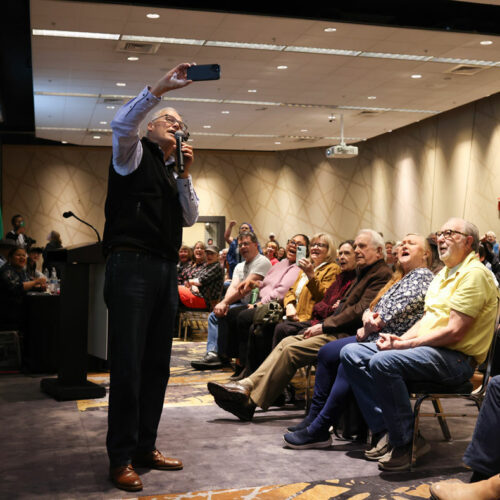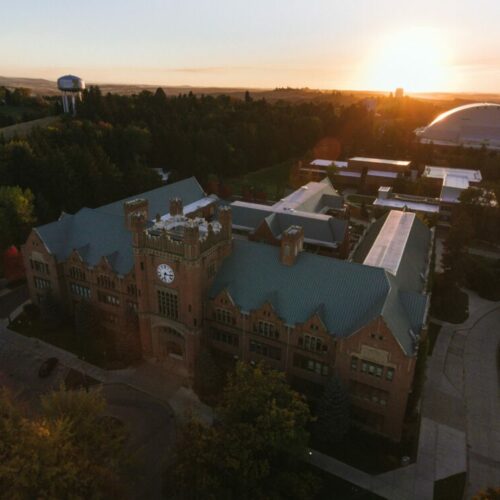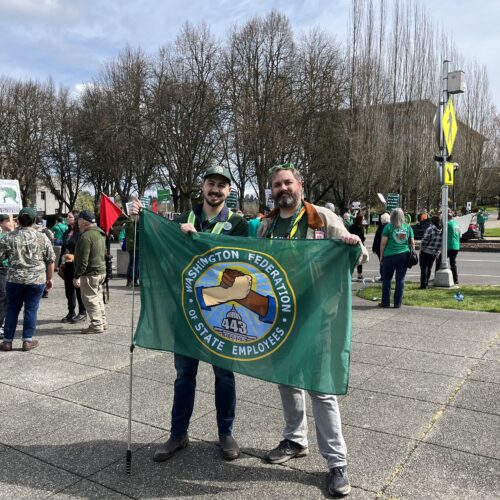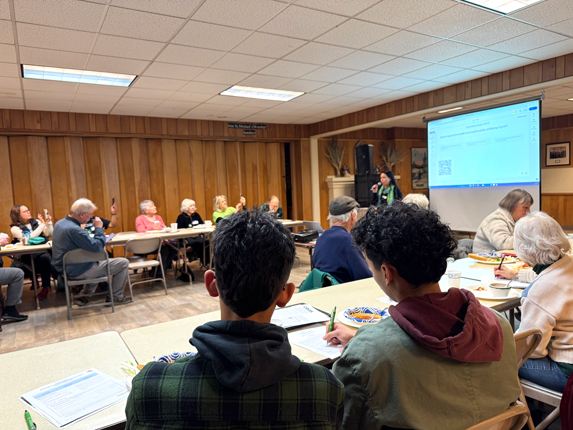
This Yakima church is getting an upgrade to its energy infrastructure
Listen
(Runtime 1:04)
Read
Nestled near a Starbucks and several banks in downtown Yakima is a stone church that’s nearly 140 years old. Even though the building has sat on this corner for so long, St. Michael’s Episcopal Mission congregants are planning some updates. Now, they’re working to upgrade its energy infrastructure.
Since this past December, St. Michael’s has installed 72 solar panels, with more in the works. It’s also adding in 36 modular batteries, which means the church could last several days without needing the grid, said priest David Hacker.
“For us as a church and as a faith community, this has everything to do with our belief in ourselves as stewards of God’s creation, and that this is all about how we care for the earth,” Hacker said. “Climate change is a major issue for us, and we feel our responsibility as faithful people to be caring for God’s earth.”
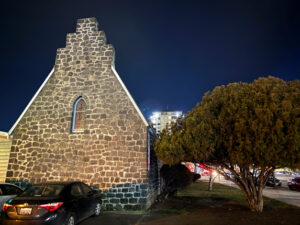
Eventually, the St. Michael’s Episcopal Mission plans to install electric vehicle charging stations, which could be used by people driving nearby on Interstate 82, priest David Hacker said. (Credit: Courtney Flatt / NWPB)
Several churches in Central Washington have added solar panels to their rooftops, he said.
“ The combination of environmental justice, I think, is the key — that we’re such a highly impacted community here,” Hacker said.
The area of Yakima where the church is situated is in a lower socioeconomic area, Hacker said, and has high pollution rankings on the state Department of Health’s environmental health disparities map. That means any way to reduce greenhouse gas emissions or air pollution, can help the surrounding community.
The project was funded through Washington’s Climate Commitment Act, or CCA, which requires businesses that emit a lot of heat-trapping greenhouse gasses to buy emission allowances equal to what they emit.
Each year, the state Department of Ecology ratchets down the available emission allowances. Companies can then compete for those allowances, reduce their emissions or do a little of both, said Caroline Halter, a spokesperson with the department.
“There are penalties for not getting enough allowances,” Halter said in an email. “So we may not see each company reduce emissions, but it’s about meeting that overall limit on emissions each year based on whatever is most cost-effective for the companies that are subject to the CCA.”
Funds from the emissions allowances collected from the act are reinvested in overburdened communities.
The state Legislature appropriates the funds to various state agencies, which can distribute CCA grants, according to an annual report by the Department of Ecology. Agencies are also able to invest the funds in other ways, like improving electric vehicle infrastructure or energy retrofits in public buildings, as long as the investments line up with the intent of the legislature, Halter said.
For the 2023-2025 biennium, the legislature allocated $3,250,249,000, according to the report. In fiscal year 2024, agencies spent 15% of those funds.
St. Michael’s received $626,100 for its solar and battery project, according to the Department of Commerce. These sorts of state funds will become important, especially to get projects off the ground, Hacker said.
“This organization runs on a shoestring and needs to have support from all kinds of folks,” he said.
In addition to St. Michael’s, several religious organizations received CCA grants this past year, including the United Churches of Olympia and Federal Way United Methodist Church.
The Department of Commerce contracted with renewable energy experts to work on feasibility studies before groups applied for funding.
“I didn’t really understand what I was getting into,” said Ann Mayer, the director of children’s and family ministries at Federal Way United Methodist Church, in a news release. “There was a lot of technical stuff I didn’t know, and they (were) there to support me and answer questions the whole way.”
Eventually, the plan is to add charging stations for electric cars, and update an electric heat pump at St. Michael’s. Right now, the church’s heating system runs on a gas boiler. The mission also plans to update its windows and change the LED light fixtures.
In addition, the project will eventually save money for the mission, which Hacker said will be put back into the programs St. Michael’s provides – from food pantries to Alcoholics Anonymous meetings to extreme weather shelters.

The Energy Basics workshop at St. Michael’s Episcopal Mission was the first of more planned energy workshops. The next one will get more into details about clean energy jobs and energy conservation, said priest David Hacker. (Credit: Courtney Flatt / NWPB)
The batteries will help when the power goes out, which Hacker said is happening more and more often.
”We have experienced (power) outages here in the last few months, several times,” he said. “So, we are going to be able to be still open for several days when the power goes out.”
Those outages will become more frequent as the climate continues to change, he said.
“We can be a place, if everybody else’s power goes out,” Hacker said. “We can be a place that’s a resiliency hub for folks.”
Energy Basics
About 40 people packed into a small meeting room at the mission recently. They gathered to learn more about ways to help save money on home energy costs.
Haya Muñoz, a project manager at the nonprofit Spark Northwest, led the group in talks about energy conservation, weatherization and funding sources to help reduce home energy use.
“ The biggest (thing) that affects energy in our home is our behavior,” she said during the presentation.
Brothers Sephen and Davante Martinez listened intently during the Energy Basics workshop. Sixteen-year-old Sephen said he learned about a hierarchy of energy needs, similar to Maslow’s hierarchy.
“ Like, what you should work on first before you think about getting a battery or solar panels. Better electrifying your home with a heat pump,” Sephen said.
Sephen, who is learning to lobby for environmental issues, said people should also look into grants and funding to help install energy upgrades to homes, especially to help avoid further climate change.
Sephen said events like this make him feel a little more hopeful about slowing climate change.
“ I know I’m doing my part,” he said. “I know if I was just thinking about climate change, and I was thinking about how sad I was, but I wasn’t doing anything, I would feel like a hypocrite.”
The brothers said it was good to see the community looking at ways forward.
“ I’m looking at all these people doing all these like super cool, awesome stuff,” said Devante Martinez, 23. “Now I know there’s actually something going on that’s going to combat all these crazy things happening with climate change.”
The mission plans to host another energy workshop on March 8.



